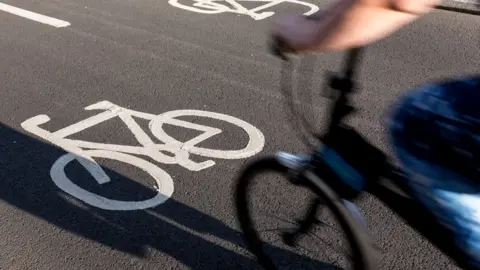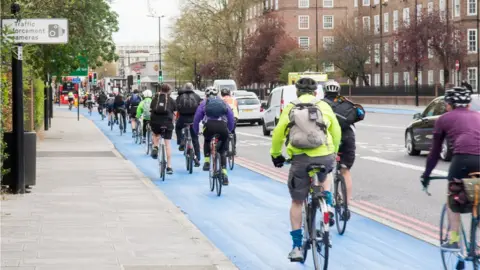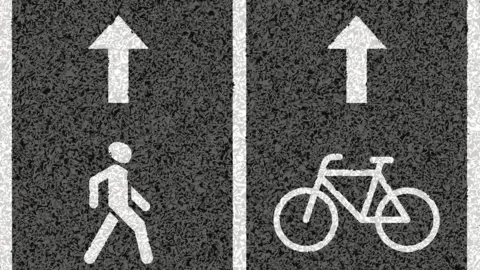No increase in cycling in Wales despite active travel law
 Getty Images
Getty ImagesThe numbers of people walking and cycling to work has not increased in the five years since a law aimed at encouraging the practice was passed.
A new report from AMs blames a lack of leadership in councils and the Welsh Government for the lack of progress that followed the Active Travel Act becoming law in 2013.
Figures also show fewer children are going to school on foot or by bike.
The Welsh Government said it would consider the report.
The report from the assembly economy, infrastructure and skills committee said that latest figures from the Welsh Government demonstrated that rates of walking and cycling were "static".
During 2013, 6% of people aged over 16 made at least one so-called active travel trip by bicycle - to get to a destination as a means of transport rather than for pleasure - at least once a week.
The figure for 2016-17 - the most recent figures - showed it stood at 5%.
In 2013-14, 46% walked for "active travel" at least five minutes several times a week - by 2016-17 the figure increased to 47%.
But while in 2013-14, 53% of children walked to primary school and 2% cycled, by 2016-17 it had reduced to 42% walking and 1% going by bike.
The figures were more steady for children walking to secondary school because, in 2013-14, 33% of children walked to secondary school and 1% cycled, while 34% walked and 1% cycled by 2016-17.
 Getty Images
Getty ImagesThe act placed obligations on councils to provide network maps - showing existing routes and future plans - and to continually improve routes for walking and cycling.
But the committee said that producing maps of routes proved to be time consuming, and that the underfunding of the process likely diverted resources from infrastructure.
Significantly more funding was needed, the report said.
Although it welcomed £60m from the Welsh Government over three years - around £10 per head a year - it fell short of the committee's own recommendation of £17-20 per head annually.
Strategic leadership has been lacking, the AMs reported, adding that the ambition of the act cannot be realised through the actions of a "few dedicated" cycling and transport officers.
"The Active Travel Act sought to transform the way people in Wales travel over short distances by facilitating better ways of cycling and walking over using the car," said committee chairman Russell George.
"However, static and falling numbers of people cycling and walking in Wales shows that limited progress has been made."
 Getty Images
Getty ImagesMr George said the committee had called on the Welsh Government "to learn lessons on progress to date, provide better leadership and much higher levels of funding to ensure that the original ambitions of the act are realised".
A Welsh Local Government Association spokesman said: "Local authorities have been very supportive of the Active Travel Act and its objectives but have always been concerned about raising expectations in the absence of any significant additional resources.
"It would be misleading the public to publish ambitious maps that, whilst they may flow with the spirit of the act, are not deliverable anywhere in the near future.
"Local authorities have taken a realistic approach, mindful of resources and against a background of shrinking budgets for highways and transport."
The Welsh Government spokesman said it would respond in due course to the report.
"Our Active Travel Act is the first of its kind in the world and we are proud of what has been achieved in such a short time with our strategic partners," a spokesman said.
"At our fifth annual Active Travel Conference last week, Economy and Transport Secretary Ken Skates urged local authorities to refine, improve and realise their plans for walking and cycling networks.
"We are accelerating delivery and over the next three years expect to earmark over £90m on active travel infrastructure improvements and projects across Wales."
